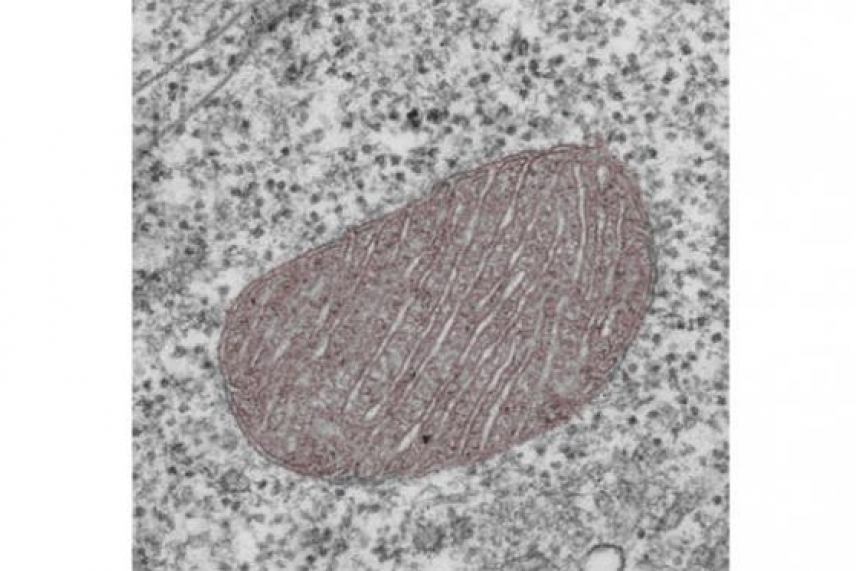Amino acid shortage curbs proliferation in cells with mitochondrial dysfunction

Electron microscope image of a mitochondrion
Courtesy of David D.Sabatini
CAMBRIDGE, Mass. – Whitehead Institute scientists have determined that stalled production of the amino acid aspartate prevents cells with mitochondrial dysfunction from proliferating. The finding overturns a long-held presumption that the nonproliferation is attributable to insufficient production of energy from the mitochondria, which are known as cellular powerhouses.
“To me, these results are quite surprising,” says Whitehead Member David Sabatini, whose lab reports the unexpected findings this week in the journal Cell. “The mitochondria have so many pathways that you can tie this anti-proliferative effect to, and lots of people were thinking about energy production. It turns out to be this other function—aspartate synthesis—which is what we identified as being really key here.”
Mitochondria are akin to power plants that supply energy to a city. With normal power production, the city functions smoothly and even grows. When the power plants go offline, urban expansion comes to a halt. In the case of cells with malfunctioning mitochondria, the factor that curbs growth is not a lack of energy, but another stalled pathway—aspartate synthesis. This non-essential amino acid contributes to protein production and is one of the major precursors for the nucleotides that compose DNA. Mitochondrial dysfunction plays a role in a host of relatively rare disorders as well as neurodegenerative disorders, including Parkinson’s disease.
Kıvanç Birsoy, a postdoctoral researcher in Sabatini’s lab and co-author of the Cell paper, identified aspartate’s role in cell proliferation through an unbiased CRISPR-based genetic screen. When he inactivated all 3000 metabolic genes in individual cells with compromised mitochondria, he determined that an enzyme in aspartate synthesis is essential for cell multiplication. Adding aspartate to serum around the cells rescued them.
The importance of aspartate production to proliferation is confirmed by work in the lab of Matthew Vander Heiden, an associate professor of biology at MIT, where Sabatini is also a professor of biology. Using a different tack, Vander Heiden also found that mitochondrial production of aspartate is necessary in proliferating cells. These findings, which are reported in a companion paper in this week’s Cell, could provide a clue as to how to help those who suffer from mitochondrial disorders.
“What if people with mitochondrial disorders get sick because their cells are starving for aspartate?” proposes Birsoy. “If you find a way to increase aspartate levels in a cell, then perhaps you can ameliorate these disorders. This is going to be our focus in the future.”
Treating people who have dysfunctional mitochondria with aspartate is more complicated that it may first seem. Because human cells normally produce their own aspartate, they did not evolve any way to transport the amino acid across their membranes.
“For that reason, it’s very difficult for aspartate to get into a cell,” states Birsoy, who is starting his own lab this fall at Rockefeller University. “That is why I do not think it will be that easy to cure these people by just providing them with aspartate. So we have to find ways to get aspartate into the cell or find ways to indirectly increase levels of aspartate in cells.”
This work was supported by the National Institutes of Health (NIH CA103866 and AI047389 grants), and the Jane Coffin Childs Memorial Fund Fellowship and Leukemia and Lymphoma Society. David Sabatini is an investigator of the Howard Hughes Medical Institute (HHMI).
* * *
David Sabatini's primary affiliation is with Whitehead Institute for Biomedical Research, where his laboratory is located and all his research is conducted. He is also a Howard Hughes Medical Institute investigator and a professor of biology at Massachusetts Institute of Technology.
* * *
Citation
Birsoy, K., Wang, T., Chen, W. W., Freinkman, E., Abu-Remaileh, M., & Sabatini, D. M. (2015). An essential role of the mitochondrial electron transport chain in cell proliferation is to enable aspartate synthesis. Cell, 162(3), 540-551.
Contact
Communications and Public Affairs
Phone: 617-452-4630
Email: newsroom@wi.mit.edu


